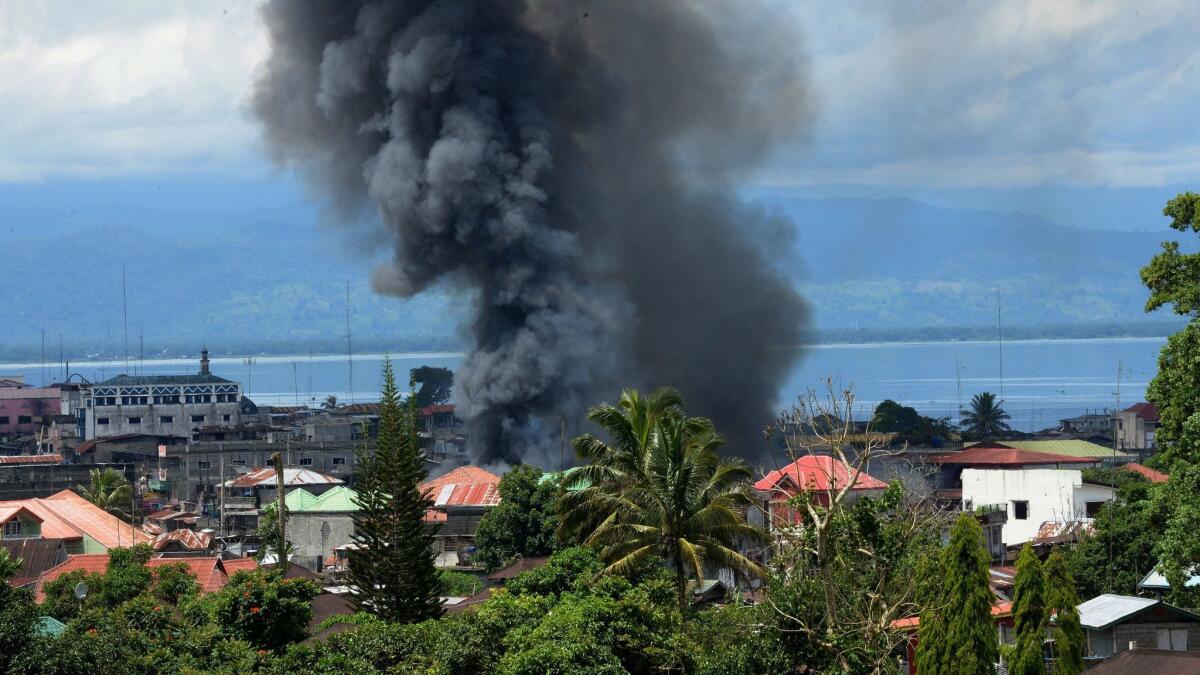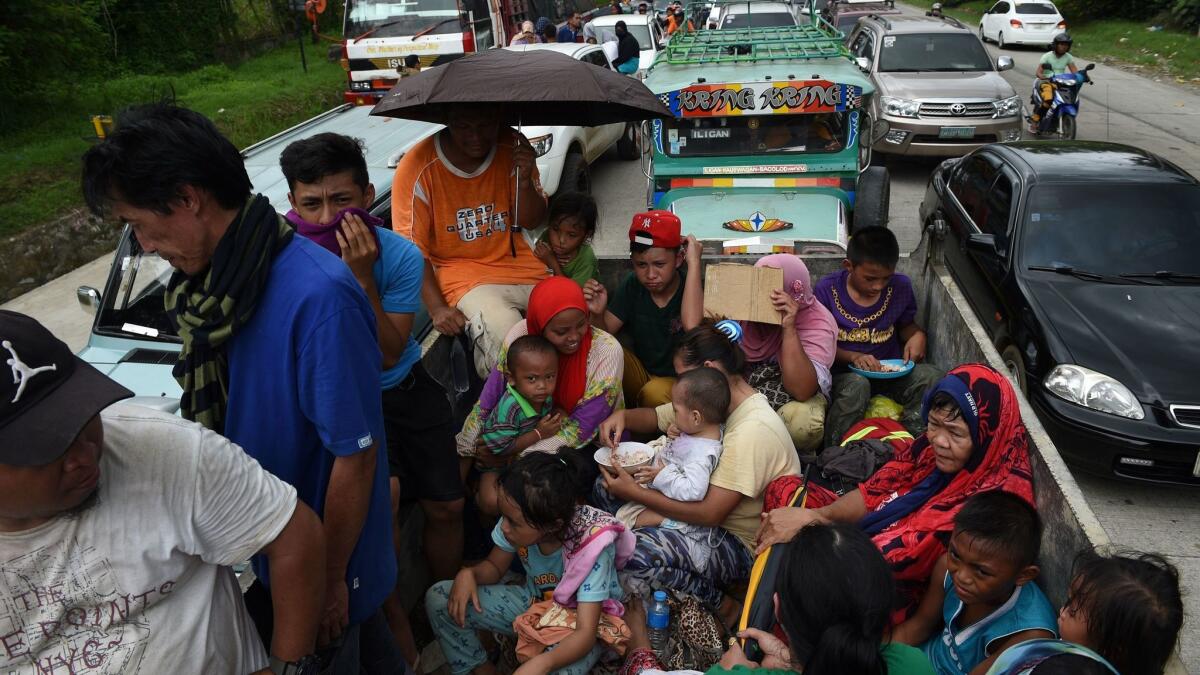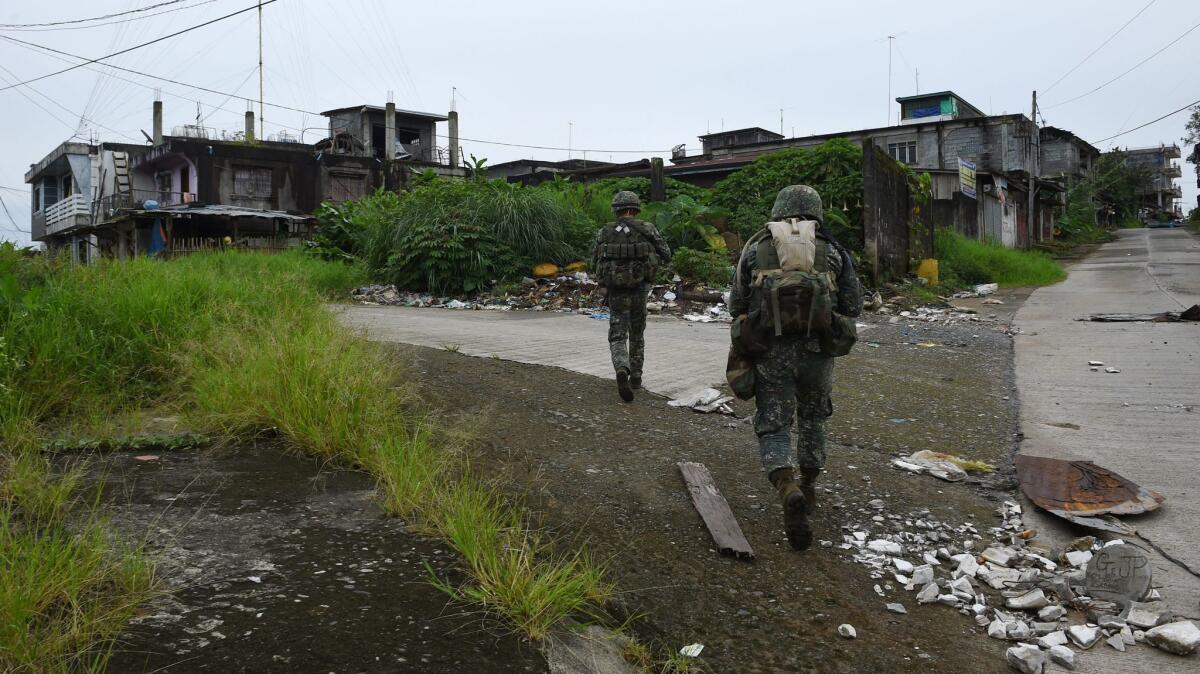A Muslim landowner in the Philippines took in Christians to protect them from Islamist extremists

- Share via
Reporting from ILIGAN, Philippines — When the first artillery fire rang out one afternoon in May, Norodin Lucman thought of the four workers repairing a cellphone tower on his sprawling property. He sent one of his daughters to tell the men to come in.
Plumes of smoke spiraled up from the city below. But Marawi, home to 200,000 people, had survived armed conflict before, and Lucman assumed this one would end in a few days and his guests would go home.
Soon, though, more people began arriving at his door. Militants were torching homes and schools, freeing prisoners, taking hostages and waving Islamic State flags.
The militants had stopped another group of cell tower workers and demanded that they recite the Shahada, a Muslim proclamation of faith. Marawi is predominantly Muslim. But the men were Christians from nearby cities. They failed the test.
When one tried to escape on his motorbike, the militants shot him dead. Amid the chaos, the nine others managed to flee to Lucman’s house.
The violence quickly morphed into one of the deadliest conflicts the southern Philippines had experienced: the Battle of Marawi.
The Philippine government sent helicopter gunships and tanks to root out the insurgents, who were being funded by Islamic State and soon saw their ranks swell as fighters arrived from Indonesia, Malaysia, Saudi Arabia, Yemen and Chechnya.
The fighting, which continues today, has reduced the city to its foundations, evoking Iraq’s Mosul or Syria’s Aleppo.
But Lucman didn’t know any of that was coming as his house became a refuge.
Scion of prominent family
On the second day of fighting, Lucman — a 61-year-old Muslim retiree with two wives and seven grown children — looked out over the red roofs of Marawi and counted 10 plumes of smoke rising from 10 battle zones.
For generations, his family has dominated politics in the city, which sits on the southern island of Mindanao and has always stood apart from the rest of the mostly Catholic Philippines.
His forefathers were traditional leaders of a Muslim tribe known as the Maranao, and his grandfather was a senator and his father a congressman.
Large numbers of Christians began leaving Marawi in 1972, when authoritarian President Ferdinand Marcos declared martial law, Muslim separatists rebelled and government forces burned the city to the ground.
The young Lucman left to study history in Egypt and then Islamic law in Saudi Arabia. One of his classmates was Osama bin Laden.
When civil unrest shut down his Saudi university, he found work as an executive assistant at the kingdom’s national airlines and used free tickets to spend time in Paris; Zurich, Switzerland; and San Francisco, gaining an appreciation for Western culture.
His father led a separatist army in Marawi until his death in 1984, when Lucman returned to assume leadership of the group, eventually reaching a peace deal with President Corazon Aquino and going to work for the government as a security advisor.
But he would continue to exude an air of independence, much like Marawi. The city continued to see flare-ups of violence until 2002, precipitating a wave of Islamic radicalization that remained largely dormant until the Battle of Marawi.
It began May 23, when government troops stormed the city to arrest the head of a notorious kidnap-for-ransom group called Abu Sayyaf and another local militant group known as the Maute quickly came to its defense.
Soon, Lucman’s house was swarming with people — Christians and Muslims, old and young, relatives and strangers. They crammed into two massive living rooms and the kitchen and napped on his beds.
Several relatives who lived in houses on the property left for the neighboring city of Iligan.
They begged Lucman to come along. But somebody needed to protect his 72 guests.
More than half were Christians. Lucman imagined it was only a matter of time before the Islamic militants knocked on his door.
“I’ll die first before you do,” he told the Christians. “If I die, you all die.”
Hunkering down with guests
Lucman and his guests listened to news on the radio and checked their phones for word from relatives.
On Day 3, the army began airstrikes on rebel positions. Amid the blasts, the guests prayed and told jokes to pass the time.
Lucman promised the Christians that when the crisis was over he would take them out to dinner with their families.
By Day 5, food and water were starting to run low. “I wanted to observe Ramadan but there is no food in the fridge,” Lucman wrote on Facebook.
The next day, the generator died, cutting off their ability to communicate with the military, relatives and friends.
Lucman looked outside and saw an elderly couple wandering the streets and told them to come in.
They said they had been dodging gunfire and hiding from the militants. Tens of thousands of people were fleeing the city, and the extremists had set up roadblocks on the bridges. They were picking out Christians and slaughtering them.
Stay, Lucman told the couple. Now he had 74 guests.
On Day 7, he decided to move everyone to his cousin’s abandoned house about 150 feet away, surrounded by a 10-foot-high fence.
Everybody had to sleep on the linoleum floor, the Christian workers in one room, families in another, some people in the kitchen.
They tried to avoid the living room, because sniper bullets occasionally came through the window.
A visit from gunmen
Lucman was resting upstairs on Day 8 when one of his guests came up to tell him three men were at the gate: militants, all in their 20s, wearing black and carrying AK-47 and M-16 assault rifles.
Lucman corralled the Christians into a musty laundry room. They were packed so tightly that it felt like there wasn’t enough air to breathe. Speaking calmly to give them reassurance, he told them not to make a sound.
Then he went outside and opened the gate.
The militants began rambling about religion.
“Don’t lecture me about Islam,” Lucman said. “I studied in Mecca!”
When Lucman asked about their commander, they said he was a Maranao — like Lucman — and promised to return with him the following day.
Lucman shut the gate, returned to the house and told the Christians to come out before one of them suffocated.
As promised, the militants returned the next day — Day 9 — and Lucman once again hid the Christians in the back room.
He recognized the commander — Abu Yaman, a 28-year-old who had also studied in Saudi Arabia. He knew Lucman and addressed him with respect.
“Why are you doing this?” Lucman asked.
“I’m doing this for jihad,” Yaman said. “I will die here, as a martyr.”
“If that’s your decision,” Lucman said, “God be with you.”
Then he ended the conversation and closed the door before the commander could ask to come in.
Great escape after food raid

Later that day Lucman dispatched two cousins — young, athletic men — to crawl on their bellies to other homes in the compound to raid the pantries.
They returned with a few bundles of rice, noodles and sardines. It wasn’t much, but anything would help.
The food situation was getting dire. The guests were beginning to eat papayas from the yard and pick leafy vegetables from the garden to boil into soup. One mother had five children, including a 10-month old boy who hadn’t eaten in days. Lucman worried the baby would die.
On Day 10, Lucman began looking for ways to help his guests escape Marawi. He noticed that every morning, between 5:30 and 6:00 a.m., the gunfire died down. He imagined the fighters were sleeping or taking stock of their ammunition. He figured that was an opportunity.
One of the cell tower workers found a way to charge Lucman’s phone with enough power for a single call.
Lucman called one of his military contacts, who told him that an army battalion was camped less than two miles away along a bridge leading to safe territory.
“We’re going out, by hook or by crook,” Lucman announced to his guests shortly after dawn on Day 12. “Say your prayers, I’ll say my prayers, and we’ll go. God will be with us. And if we live, thank God for that.”
He instructed them to form a line and led them out of the house. They snaked through back alleys and onto a road. Neighbors joined the group, which grew to more than 140 people.
They carried white flags and moved quickly with their heads down. Sniper bullets pelted the ground.
The Christian men carried children, and the Christian women wore head scarves, to give themselves the appearance of Muslim families. They shouted “Allahu akbar!” — Arabic for “God is great.”
At one point, an armed militant approached the group. “Who is Christian?” he shouted.
“There are no Christians,” one of the Muslim women replied.
The group ran on. When it finally arrived at the bridge, government soldiers were waiting to lead the way across. On the other side, Lucman looked around. The soldiers and nearly everyone else were in tears.
Because the Christians were not from Marawi, they would soon return home. Most of the Muslims were bound for camps for the displaced.
But at least everyone was safe, Lucman thought.
A city in ruins

Since the Battle of Marawi began, more than 600 militants, 130 soldiers and policemen, and 40 civilians have been killed — some of them trying to get to Lucman’s house.
Philippine military officials said in late August that only a few dozen gunmen remained in the city, confined to one small neighborhood.
As the fighting continues, the scope of the devastation is becoming clear. Most of Marawi’s population fled. Months after the fighting began, some neighborhoods were still strewn with rotting bodies.
Lucman now lives with one of his sons in the nearby city of Cagayan de Oro, but spends most of his time with other family members in Iligan, not far from a makeshift camp of more than 1,000 people displaced by the violence.
He still visits secure parts of Marawi each day to advise government forces on how to end the battle.
“There are many cases of Muslim employers who died because they were protecting their Christian employees,” Lucman said. “It’s so sad. Because after my breakthrough, some people tried to do it themselves, and they failed.”
He said he hadn’t been especially worried for his life — he was well-known. Islamic State “can kill me at their own risk,” he said. “Because killing me would be a very, very big issue in our society. You don’t kill someone like me. There would be retribution everywhere.”
One day, he called some of the Christians who had stayed at his house those 12 days. “Remember the promise I made you,” he told them.
That night they all ate barbecue together.
For more news from Asia, follow @JRKaiman on Twitter
ALSO
From Malala to the Taliban, anger across Asia at Myanmar’s violence against Rohingya Muslims
U.S. military apologizes for ‘highly offensive’ leaflets it distributed in Afghanistan
More to Read
Sign up for Essential California
The most important California stories and recommendations in your inbox every morning.
You may occasionally receive promotional content from the Los Angeles Times.













